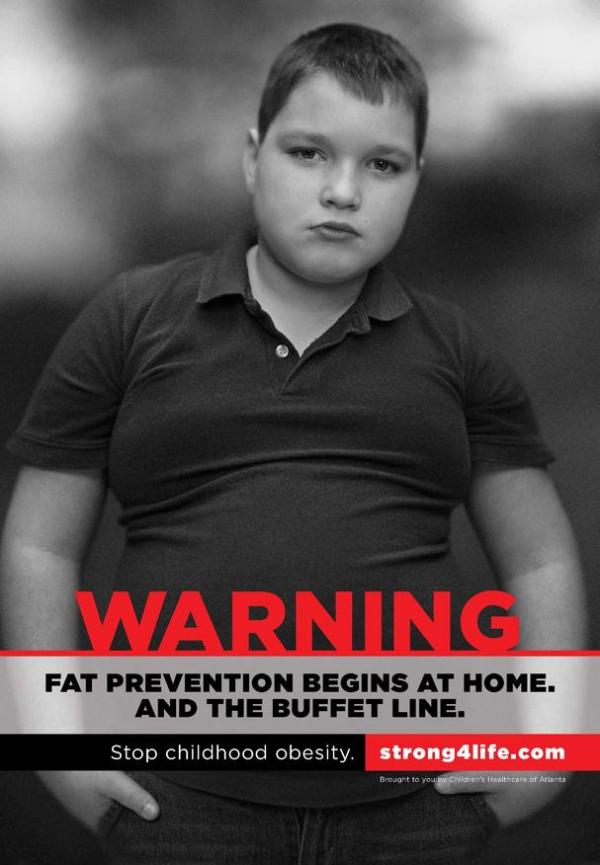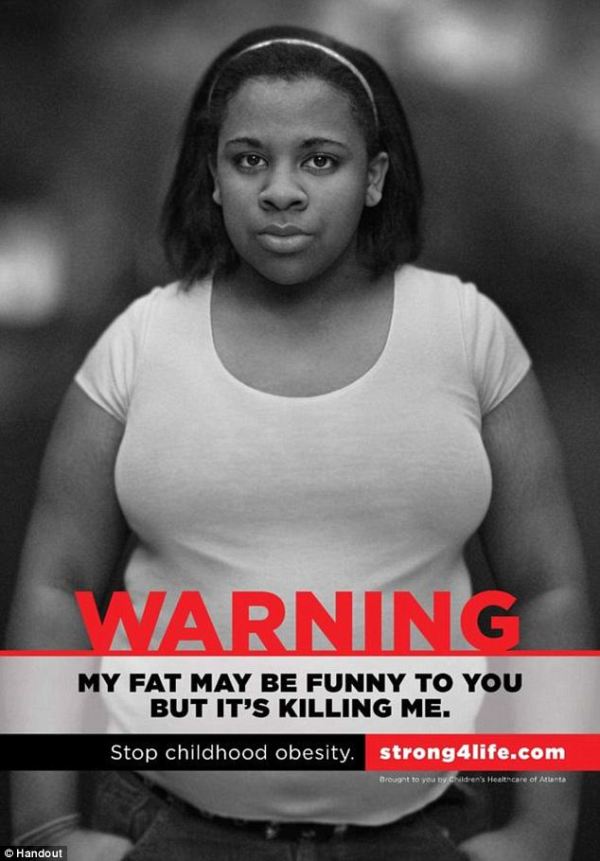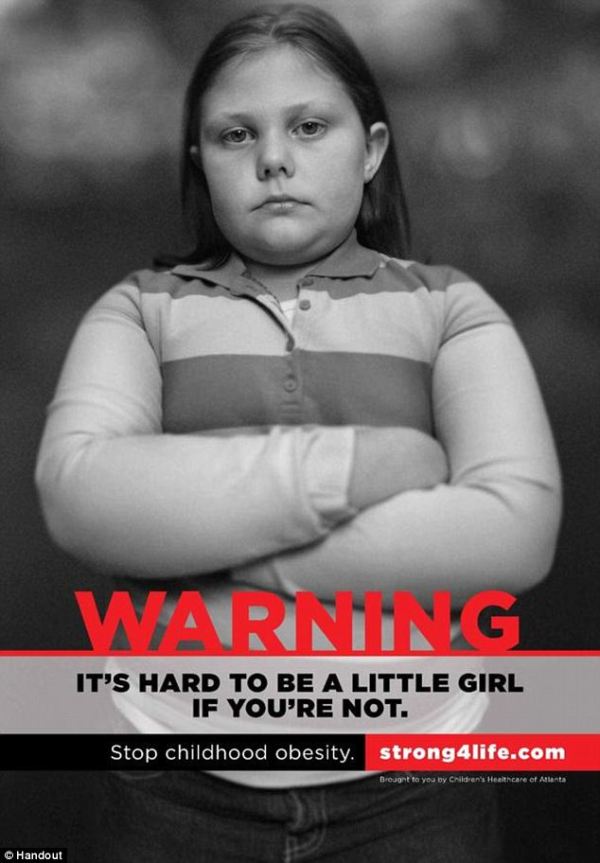Hey Georgia, what were you thinking when you released your new anti-childhood-obesity campaign? It’s humiliating. It’s condescending. And it’s not going to help anybody.

These images are a part of Georgia’s new anti-obesity campaign, which has an ugh-worthy title: “Stop Sugarcoating.” The campaign features black-and-white images and videos of overweight children plus a whole lot of humiliating commentary. In one video, titled “Bobby,” Bobby sits in an empty room opposite his mother and asks her, “Why am I fat?” The following black and white text panel reads: “75% of Georgia Parents with overweight kids don’t recognize the problem.” In another video, titled “Jaden,” Jaden says “Playing video games is all I like to do, alone … because all of the other kids like to pick on me.” Then a black and white text panel appears that reads “Being fat takes the fun out of being a kid.”
I think that promoting healthy eating and exercise in children is a good idea, but the problem I see here is the campaign’s angle: The “Stop Sugarcoating” ads aim to educate parents about childhood obesity, but instead of providing solutions to the issue, they offer humiliation and guilt. The ads suggest that if people are aware and ashamed of their obese bodies, these families will fix their problems on their own, which is entirely unreasonable. The campaign doesn’t offer proactive ways to help, and it doesn’t take into consideration the socioeconomic, emotional and mental health and food-access issues that contribute to regional tendencies toward obesity. The fact of the matter is that healthy eating costs a lot more, and in the middle of one of the worst recessions America has ever seen, it’s not something everyone (or even most people) can afford. There are many, many barriers to “healthy eating,” especially if you’re of low socioeconomic status, including the step of knowing what “healthy eating” even means. Guilting parents doesn’t help start a conversation around why healthy and fresh foods are so much less accessible to poor families than processed foods, which is something that might actually help children in Georgia.
There’s also the problem of stigmatization. The ad campaign is trying to make families and children more aware of what obesity looks like because three-fourths of Georgia parents “don’t recognize the problem.” But obesity is already very stigmatized. In one ad, a voiceover says “As her mom, I never noticed Tameka eating any different than the rest of us. She likes junk food but what kid doesn’t? When the doctor said she had type 2 diabetes, I didn’t realize what we ate would make her sick… I just always thought she was thick like her mama.” Or another ad where a boy wrenchingly asks his mother, “Why am I fat?” How does this make things different or better for overweight children? How is it original or progressive to re-emphasize the stigma that these kids already face?

By pinning Georgia’s childhood obesity problem on parent and child, this ad campaign is absolving the state of the responsibility for addressing this social and state issue. How about rethinking school lunches? Restructuring afterschool programs to promote exercise? Making fresh produce more accessible to families not only through location but through cost? By stigmatizing obesity, the ad campaign is alienating and othering those who are obese and their families, which only perpetuates the problem. I should know — that was me once, mocked by my peers and teachers for eating Hot Pockets for lunch when it was all that my mother packed for me, and all guilt and shame did for me was make me wish I didn’t exist.
This is what happens when you use stigma to “solve” childhood obesity, without offering healthy suggestions or considering how family life and mental health both have a hand in obesity. Overweight kids become defined by weight, and even when they lose weight, their problems aren’t solved — their emotional and mental health don’t improve and their coping skills don’t improve. The only thing that’s changed is that they’re skinny. Stigmatizing children and their parents isn’t the way to go — it’s not empowering. It’s the opposite of that entirely. Obesity is not just an isolated problem of overeating and consuming too much of the sugar in the “Stop Sugarcoating” campaign title. It’s a problem with cultural and economic implications. It’s a problem with mental and emotional health implications. It’s a problem that needs to be addressed with nuance, because obesity is a nuanced problem — making people feel guilty for eating will not fix everything.

Hey Georgia, you should reconsider this “Stop Sugarcoating” campaign. You should stop with the stigmatizing and body hate that your campaign is highlighting. Maybe you should do it this way: The Obama administration’s Anti-Obesity Task Force (and the associated Let’s Move! program) has at least been proactive in listing ways to help deal with childhood obesity by “ensuring access to healthy affordable food,” “increasing physical activity in schools and communities,” “providing healthier food in schools” and “empowering parents with information and tools to make good choices for themselves and their families.” The key word is here “empowering.” The secondary key word is “good.” As in positive. And while positivity isn’t 100% effective, I’d say it has a better chance of working than stigma.








Comments
*buries face in hands* I know, I know.
Children’s Healthcare of Atlanta is usually much better at this sort of thing– their last campaign to raise awareness for childhood obesity was a series of radio ads encouraging parents to get their kids to get outside and play.
I saw the print ads on tumblr a little while ago — a fat activist blogged about how they were being posted almost exclusively at the time at bus stops, further emphasizing the class element. However, I didn’t realize that there are, or are now, video ads. It’s absolutely fucking HORRIFYING. Looking at any of the ads makes me want to punch something and yell at the adults responsible and give every fat kid (especially those poor models) huge hugs. I could write forever about how much I hate this, but you’ve done a commendable job of that already.
“In another video, titled “Jaden,” Jaden says “Playing video games is all I like to do, alone … because all of the other kids like to pick on me.” Then a black and white text panel appears that reads “Being fat takes the fun out of being a kid.””
I was that fat kid when I was growing up, and you know what? Being fat didn’t take the fun out of being a kid. It was other kids making fun of me that took the fun out of being a kid, and I resent the hell out of the implication that weight is what’s to blame there.
exactly! ugh this made me so mad. why can’t we start by telling kids not to pick on each other? unfortunately, i think this campaign is just going to lead to more bullying.
I feel that way too. The implication here is that people are responsible for being fat –> they are bullied for being fat –> being bullied is their fault. And I absolutely hate that, especially since I was bulled a lot as a kid because I was overweight. You can’t blame children for that. It just leads to a whole lot of self-hate and self-resentment.
This is so demeaning and ignorant, I don’t even. And it makes me so mad; people who make unhealthy foods target children, knowingly. Children are so vulnerable, and then to turn around and throw it back like this. Ridiculous.
these are horrific. the problems and stigmas associated with obesity are only being perpetuated by these ads. what’s frustrating is that overweight people know they’re overweight. we do not need ridiculous commercials and advertisements to blatantly reinforce society’s pressure to be skinny – not healthy, skinny.
i can’t even believe this was approved by a healthcare organization. not even one of the ads had ANYthing helpfulto connect people/children to a healthier lifestyle. how about helping families find healthy substitutes for junk food? or how about having more access to foods that are good for you? or how about providing information on different types exercises? no – instead this organization has decided to use their money to intimidate people into not being “fat”.
These ads are all over the place, hovering over fast food restaurants. I honestly don’t know what to think of them, they are in your face-raw-look at what we have done to our kids kinda thing. There are other ways to get that point across… and instead of humiliating children, they should blast the parental units that have let the kids they are supposed to love, to get obese.
Or they could focus on the fast food industries themselves for the unhealthy food they promote. They could criticize the government for failing to provide healthier options for low-income families and for failing to end the urban deserts where a lot of those folks lived. They could criticize advertisers for targeting younger and younger children with commercials and campaigns designed to pull them in. They could criticize the government again for allowing advertisers to pander to children who can’t yet critique and dismiss ads as adults can.
This isn’t the parents. This is an entire culture of food consumption that has gotten completely out of hand and taking its toll on our most vulnerable citizens.
Excellent analysis, Salicet. I have a few things to add since this topic, contrary to this simplistic, lazy, irresponsible campaign, is extremely complex and points to the need for a number of critical changes to American society if Americans are to have a chance at eating healthy diets.
The campaign could focus on the disparities in availability and cost of produce and non-processed foods between upper-middle-class and working-class neighborhoods. I’ve lived and worked most of my life in working class neighborhoods, but I’ve shopped in markets in more upscale areas many times.
In working class neighborhoods, corner stores rarely offer a wide variety of fresh produce, and if they do, it’s often priced at a premium. This situation is rarely a result of greed on the part of the market owners (who are often scraping by working 16 hour days with their family members, including their children). The premium is placed on, say, apples, because the market owner has to buy them in another neighborhood and spend gas and time to bring them to his/her shop.
This dreadfully lazy “blame/shame” campaign would also do better to focus on the subsidies given the corn industry that allows producers of processed foods to include corn syrup and its by-products in all of their products in order to PROFIT.
Americans no longer work active jobs in manufacturing or farming, jobs that used more calories than desk jobs or a retail/clerk jobs. Americans also do not eat the huge eggs/bacon/biscuit breakfasts, and meat and potato lunches and dinners that they used to eat.
Americans DO eat far too much fast food, because it is convenient, available even in working-class neighborhoods, and cheap. They also eat far too much processed food, again because of economic determinants. I know how most of our our great-grandparents ate, and they did not eat healthy. This fact has not escaped me as I’ve followed the dialogue around American obesity.
I believe processed food and the cheap ingredients used in manufacture of these fake “foods” are responsible for a good deal of the obesity problem because our bodies are not evolutionarily prepared to process these “foods” properly. I’m sure there’s a more sophisticated, scientific explanation of the problems processed foods cause the human body, but I don’t see the government or the private sector advertising those explanations, so I’ll stick with the hypotheses I’ve arrived at from my own research and thought.
Another factor affecting weight is the that opportunities for movement are restricted for children and adults. Most people of all classes spent at least an hour a day walking to their workplaces and schools. Cars and suburbs have created a sedentary American populace. Recess and physical education have been slashed from schedules due to the budgetary constraints which have eviscerated our public school system.
These ads place all of the blame on citizens who already the victims of massive societal shifts due to de-regulation, economic changes and the astonishing ballooning of costs associated with late-stage capitalism.
Aside from the fact that blame NEVER helps a willing person make positive, constructive, long-term changes, it’s almost obscene that, once again, a symptom of the decimation of the working and middle classes at the hands of corporatists and venal, short-sighted, selfish politicians is laid at the feet of the American people who are shamed into searching for their own solutions with no help from government or the markets that benefit from the very problems people are trying to overcome.
These ads make me sick. This kind of simplistic blame-the-victim crap is exactly what motivated people to burn witches because of unexplained phenomena that they lacked the tools to explain or control, such as poor yield from poor agricultural techniques, or destructive weather patterns, or epidemics of scarlet fever.
The thing is, we now have the knowledge and the tools to explore and explain complex phenomena and devise programs that will yield the results we want. In fact, we don’t even need to do that to help people eat healthier diets. The comments on this AS article will probably provide every single method that actually helps people lose weight and live healthy lives.
But the temptation to scapegoat and vilify the “Other” triumphed over common-sense and compassion. Looking a little deeper, the real solutions to the “obesity epidemic” might just require extensive societal changes and might cost someone some profits, and we can’t have that, can we?
Resorting to “blame and shame,” which has been shown time and again to fail, is a lazy, uninformed, hateful technique employed by people who know better, but took the easy way out. Disgraceful.
Thanks for the insight! It will definitely help the next time someone pulls the “fat people are lazy” argument.
In truth, the real lazy people are the ones using that argument- they’re the ones who aren’t actually THINKING. Lazy fuckers.
That doesn’t help, either, believe me! My mum is incredibly body-fascist, and she decided that my little sister was getting fat when she was just 9. She put her on a 3-day diet which consisted of a single raw egg beaten with ketchup 3 times a day. Only water to drink. She thought she was helping her out when she did that, and when she told her (frequently) that she was overweight (I don’t remember her being particularly overweight, to be honest). Thirty years later, my sister is an incredibly intelligent and highly respected woman who addresses international conferences in her field, but still has serious issues with food and a poor body image.
i am so confused! these are actual children on these posters, right? like living breathing human beings? what in gods name would encourage a child or their guardian to have their child on a poster like this? i mean, the rest of the stuff in this thing is more important, etc, but i just had to get that out there
This was my number one feeling as well.
Probably getting paid, right? Especially if the family didn’t have much $$. Also, as an actor when the work is so sparse, especially if you don’t look ‘mainstream’ it’s awful hard to just turn down your own job offer in a year. But yeah, I
gah, I got cut off! I meant: But yeah, I can’t imagine how damaging doing these ads must be. In Spanglish (that cheesy movie) they used a fat suit so a real little chubby girl wouldn’t have to hear those things about her body.
Ditto these are real children, I feel like they are selling their soul or something, it just does not feel right at all.
I’ve been seeing those ads at the MARTA stations at least since September, and wondered why I’d yet to hear anything about it from any of the media. Personally I think the creators of the campaign set out to shock more than to stigmatize with ads that were in extremely poor taste, kind of like the extremely disconcerting meth commercials that have been airing – but that could just be me.
But yeah, you do have to wonder what kind of attention whoring parents would put their kids on those ads. It’d be a cold day in hell.
“But yeah, you do have to wonder what kind of attention whoring parents would put their kids on those ads.”
These ones? http://www.youtube.com/watch?v=v_F8Qx677iU
geez. when is the media gonna learn you cant shame Americans into doing ANYTHING. especially when it comes to being fat? lol. sad times.
I remember driving down the street in Atlanta, and seeing the”It’s hard to be a little girl if you’re not”, plastered on a billboard. It made me feel extremely uncomfortable. It was like the entire state of Georgia was tormenting this child.
WHAT. that’s horrible.
honestly, i think the worst part of this campaign is the way they’re using the ideal of the “pretty little girl” to shame people. they aren’t making this about health. they’re making it about looks.
almost like a circus sideshow, they’re using ominous greyscale imagery and dark music to portray these kids as grotesque freaks. and THEN they have the nerve to tell us these kids don’t have any fun or friends, which is their own fault because they’re too fat.
i mean, seriously. this is not constructive at all.
What the fuck even?! This literally made me feel sick. I was that kid and all of those stigmas still follow me around on a daily basis. Jaden’s ad suggests that he should just be different, so the kids don’t bully him. Well, doesn’t that sounds like a familiar argument. Obesity is definitely something we do need to face, but it’s something we need to change in a positive manner and this campaign doesn’t seem to understand the definition of the word “positive.”
Wow. These ads are completely appalling and disgusting and horrible.
I. CAN’T. EVEN.
Way to make so many more problems than you could possibly solve.
I wonder how many children these ads are going to make feel terrible about themselves?
everything. everything is wrong with these ads.
this is horrible. i can’t believe someone approved them. what were they thinking?
I can get where they are coming from with this. They are trying to do the only “effective” way to get people to combat childhood obesity — shame. Tell a parent they suck a parenting in a cold and calculated manner, best believe they’ll try to better themselves. Tell a kid they are fat and need to slim down in a cold and calculated manner, best believe they’ll try to better themselves. If someone tells you that you suck at something you don’t want to suck at, you try to better yourself. It’s a common tactic and a hurtful one at that. The problem with that comes in when kids develop eating disorder or parents become depressed because they can’t help or don’t know how. Yes, it gets people to try. Does it often end well? No. In some ways, it ends up being a lot worse.
Yeah, they definitely didn’t follow their argument through to the conclusion. Shame is never effective in the long run.
Oh great. This whole line of thinking is screwed up, overweight kids KNOW they are overweight. This is pretty much just state sanctioned bullying.
GOD DAMNIT. I fucking hate this shit. Not only is this tactic fucking humiliating, it’s fucking oversimplifying it. Because honestly, people eat unhealthy shit probably because of one thing: lack of money. It would be nice to afford shit that isn’t processed and or a dollar but it’d also be nice to not blow half your fucking budget on food. Getting to college really brought that shit to my attention and this fucking campaign isn’t doing shit but making people (including kids) feel worse about themselves. Positivity motherfuckers, it’s not that hard to spread.
It’s ridiculous how you say that eating healthy is too expensive for most households to afford in the recession. You make sacrifices like not buying kids X-boxes or buying big tv’s, or cable or whatever. Quit whining that the world is unfair and go work out. Jesus.
Oh, sorry, this is so embarrassing but uhm… your privilege is showing. You might want to check that.
Except growing up I didn’t have cable, our TV was about twenty years old, most of my clothes came from Walmart/goodwill, and my mom could still only barely managed to feed us. I guess we should have given up that big, expensive trailer we lived in?
My mom worked her ass off. I’d bet many of the overweight kids in the South are in the same boat, so shut it.
Who the heck is buying an x-box or big TV in a recession when they can’t afford healthy food? these people probably don’t even have cable or are even buying anything extra in the first place… That’s the point. They don’t have extra money PERIOD. you obviously have never been poor.
Actually it does happen and there’s a very good reason for it. Using that argument though is a clear sign of some unchecked privilege.
Poor people shouldn’t have nice things is a terrible thing to say.
Exactly. If I want nice things I save for them and then get them at outrageous discounts. I could sell my flute, or my TV, or my Xbox, but then I would be hungry AND depressed as soon as that money was gone. I never buy a TV instead of food, but sometimes there are periods when money runs out. Being sick, I sometimes have to take long breaks from work.
It makes no sense to villify people for not giving up their TV when the government can’t be arsed to give up killing people instead of feeding its starving citizens.
Seriously, we had a tiny black and white television…I am 27 for reference. Also, our house didn’t have insulation and we only had a gas stove in one room…but at least we had all those fur coats to keep us warm. Poor fat people are lazy and bad with money, thank you for pointing that out Ted. >:(
jerk.
p.s. it continually amazes me that people believe shame has ever been an effective way of fixing anything. Thank you writing this Whitney!
Mental and emotional illness definitely plays a large part, in my experience. I am from a single parent family with a mom that worked usually around 60 hours a week, I learned about depression and it’s hopelessness at a very young age.
Whitney, I LOVE you for covering these here. I don’t understand why any ‘anti obesity’ people want to make fat kids ashamed and hateful towards their bodies – why would you want to look after something you hated?
“Why would you want to look after something you hated?”
Yesss. This. I really abhor the way we perceive shame as a legitimate tactic in the “fight against obesity” (which I have complicated enough feelings about at the best of times). Especially the shaming of children. Everyone deserves to love and feel comfortable in their body- not just people who fit into a certain ideal type. As a fat kid, now grown into a fat teen, I was on the receiving end of that shaming and I can tell you it did nothing to make me thin- but so what even if it had? Would it have been worth completely destroying my relationship with my body in ways that are still hard to repair? No. The kind of actions motivated out of body-hate are not healthy; if the goal really is to improve health then campaigns which encourage a culture of body-hate should be rejected.
I was a fat kid, too — and I ended up losing a lot of weight because of crazy not-eating stretches. And you know what? Because of all of the fat stigmatization I experienced growing up, I still feel bad about myself. Because fat stigma turns into just stigma and when you don’t have any fat left to stigmatize, the hate ends up getting all over everything else in your life, too.
That’s horrible, Whitney <3
Also thank you for writing this.
This comment, 100%.
This is so true. It also takes so much more courage to start (or continue) exercising when you know everyone else at the gym/pool/park/whatever is judging you. Even athletic fat people have to deal with that ignorance at the gym. Shaming is never going to make anyone healthier.
Way to fail, home state. Not only are these ads insulting, condescending, and classist, but writing a mother (of color?) describing a daughter as “thick like her mama” might also be racist??
I hope these kids are actors in fat suits, because if they’re real chubby children, their self-esteem might now be irrecoverable. I just want to hug all of them and tell them they’re good people.
I caught that too. Who are they to use “thick” in this context? The adoption of “thick” as a positive descriptor in our vocabulary signaled acceptance of beauty that doesn’t fit the pernicious racist model of “Thin, Skinny-Featured, Flat-Assed White Beauty” that oppressed and stigmatized most women and people of color for centuries. “Thick” doesn’t mean “fat.” It expresses a number of meanings, all positive.
It’s not too difficult to trace the birth and growth of the myth of “White Beauty” from the days of early exploration and slavery. Their use of “thick” is inexorably linked to the insecure, bigoted, disastrous program of Othering and stigmatization that we, in the early 21st century, are just beginning to fully understand and discredit.
They need to check themselves. Is it even their word to use? This whole campaign is so wrong in so many ways that it makes my head spin.
The Jaden one really disgusts me, because it doesn’t just send a message to fat kids, it sends a message to all kids that shaming fat kids is natural and inevitable and it’s the job of the bullied kid to stop making themselves a target. Ugh.
Kids learn fat shaming from adults. It isn’t an inborn trait.
“it sends a message to all kids that shaming fat kids is natural and inevitable and it’s the job of the bullied kid to stop making themselves a target.”
yes. this campaign is so upsetting and fucked. i can’t believe it’s been going on since september!?
whitney i love the way you tackled the list of terrible ignorant things going on here. thank you for this!
one of my best friends is a nurse at CHOA, and she is ashamed and appalled by this ad. its so terrible. its unfortunate that so many caring, decent people just want to help kids feel better and live happier lives and this is what comes out of it. My nurse friend sees children on an HOURLY basis that are under the age of thirteen and cannot be lifted by two even three grown women, have type two diabetes, depression, high blood pressure…its all so sad. i dont mean to take away from the conversation about how terrible these ads are…they are inexcusable. but getting a glimpse of the reality from a nurse who treats these children is equally heartbreaking. if i had the brain/money/resources for it, i would dedicate my life to figuring out how to ACTUALLY help these kids because it is a real problem that is ruining lives but as a lifelong overweight person (who has really tried lots of unhealthy things not to be) this is about the worst way to address it i can think of.
yeah, i agree. it’s criminal that even though we KNOW how to address these problems (i.e. by taking on the ag. industry and the corporations that make fake food products and then market them to kids) we’re still doing things like this.
what we need is a sea change in the support and subsidies we give to fast food and junk food industries. they shouldn’t be allowed to market and sell poison to kids – or anyone else for that matter.
Beautiful reply. Thank you and L for your comments.
why thank you :) i liked your comments a lot.
And I think we need to start by demanding healthier school lunches.
I think the failure in these ads is mainly in criticizing the children. Children will choose the food it taste better, but parents should be better than that and educate children to eat in healthy way.
I don’t think these ads are an answer, not even close, but the problem is real.
What I don’t understand is: what do you mean when you talk about junk food? I mean I thought it was fries and so on, but I don’t think you can lunch with that! And I don’t really get the study on the cost of healthy food. I mean it compares junk food to vegetables. It’s obvious that one cannot feed on vegetables only, without requiring tremendous amount of that, right? Carbohydrates comes from pasta, bread and if you want potatoes.
i’ve done a bunch of work in schools, and unfortunately, most american school lunches are the nutritional equivalent of french fries. sometimes they throw in carrot sticks or a “salad,” but usually it’s so unappetizing that the kids don’t eat it. more often the “vegetable” is pizza or the fruit is a very green banana. the school breakfast is even worse – rubbery “waffles” with a giant packet of corn syrup, or a sugary cereal. the kids wind up hyperactive for half an hour and then they’re practically falling asleep.
Okay thanks for claryfing! But there are not some,like,rules about what you can serve for lunch in schools?
Since so many kids eat in the school is it not possible to ban food full of calories and serve only fresh food? I think there should be a law for that. School must educate too to a correct and balanced diet! And since,if I understand correctly,they serve half of the meals they could do a lot!
Moreover I think it is really absurd that ready meals cost less than fresh food. Is it because there’s a lot of request for that?
Because I mean, like here there are 20.000 types of pasta and choosing the cheaper will make you save a lot of money! But I guess it’s because we eat a lot of that.
unfortunately, it’s because the agriculture and food industries are hugely influential in making policy. they lobby and bribe our legislatures so heavily that it’s political suicide to back a law that hurts them.
unfortunately, this doesn’t even help small farmers who are honestly growing real food. it just helps the giant corporations that grow corn, soy, and factory-farmed livestock, and the industries that sell them in various food products.
The ingredients/farmers that produce ready-made meals are heavily subsidized by the American federal government, while farmers that produce vegetables or less heavily processed meat are not.
The price of unhealthy food is kept artificially low by these policies while fresh produce and good quality meat in the US is significantly more expensive than it is in other countries with similar economies.
Thanks, Whitney, for writing this article. And I too am someone who was bullied for being overweight as a kid and have subsequently dealt with severe body image and self-worth issues all my life. So this shit makes my blood boil. I really just want to give the children in these ads a hug and tell them that they are beautiful just the way they are until they believe me. I can’t though, so I hope they have someone who is in their lives that will.
I think pro anorexia and pro obesity groups are essentially outgrowths of the same problem, and that problem is shame and the link between physical appearance and self worth. Because we have linked physical appearance and self worth we now cannot look at obesity (or being extremely underweight) as only a health problem. It is now a comment, no matter one’s beliefs/politics whatever, on the worth of a person. I don’t think we can really deal with obesity related issues until shame is taken out of the equation and this ad campaign does the opposite of that. Yes, being overweight can be a problem (even if you have perfect blood pressure and cholesterol, let me just address that right now. Which I do, by the way, but being overweight can and does contribute to heart disease and I wouldn’t know it through the average test.) and a reasonable amount of exercise and managing eating habits can do wonderful things for people, including helping to regulate sleep, improve mood, etc. But saying, in essence, GET ON THAT TREADMILL YOU FAT PIG SO YOU CAN HAVE WORTH AS A HUMAN puts up walls and makes everyone a little bit less compassionate.
Some other fragmented thoughts include that bodies are not so easily categorized. I think people assume, when this topic comes up, that your choices are SUPER MODEL THIN or HUGELY COMEDY MOVIE OBESE, and many people with many agendas use either/or argument. We have to get away from that in order to be healthy. Extremes are always to be suspected, I think, in any and all directions.
Nicely written – you really nailed the nastiness behind the campaign. These ads are a symptom of a problem of a larger problem in our society than obesity – using public health “concerns” as an excuse for cruelty.
I build an exercise app and my take has some different shadings on the problem than yours.
For one thing, I think the problem runs wider than Georgia. http://www.roadbud.com/blog/watching-the-fatties-cry/
Can we have a “Stop Being Dicks to Children” campaign?
Let’s have that.
Mona Lisa ate a bit too much pasta, why isn’t she a Georgia poster gyrl?
What does it say about Western society when the front cover of most magazine’s aimed at women have a diet article mentioned on the front cover and “sinfully scrumptious” dessert recipes in the back section?
@Marsha, It means that they have no intention of letting us win.